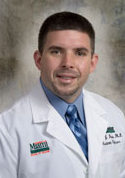
Frank Penedo, PhD, a nationally-renowned health psychologist, will join Northwestern University Feinberg School of Medicine on June 1 as a professor of medical social sciences. He will also become the inaugural Roswell Park Professor on June 11 and will lead the Robert H. Lurie Comprehensive Cancer Center’s Cancer Control and Survivorship Research Program.
“We are delighted to welcome Dr. Penedo to the medical school,” said Eric G. Neilson, MD, Feinberg’s vice president for medical affairs and Lewis Landsberg Dean. “His reputation as a scholar of health disparities and outcomes in ethnically diverse populations will further add to our strong standing in these areas. As director of our cancer control program, he will lead our research into the most effective ways to promote cancer prevention, early diagnosis, and treatment in local, national, and international communities.”
Penedo has served on the faculty at the University of Miami since 2000, most recently as an associate professor in psychology. He also held a secondary appointment as an associate professor of psychiatry and behavioral sciences. Earning his bachelor’s degree, master’s degree, and PhD in clinical psychology at Miami, Penedo has been honored with numerous awards over the past decade, including the Society of Behavioral Medicine Early Career Award in 2005 and its Distinguished Service Award in 2008.
“Dr. Penedo is a very successful researcher in the bio-psychosocial aspects of cancer and he excels at bringing these aspects together into one coherent understanding of the disease,” said David Cella, PhD, medical social sciences chair. “A well-published, highly respected researcher, Frank has a strong track record of funding in cancer control and related fields. He is a unique talent, and his interdisciplinary nature will be an asset in fostering collaborations, a necessary skill in today’s medical research environment.”
As director of the research program in cancer control, Penedo will be charged with bringing together the diverse talents of more than 40 Lurie Cancer Center members researching screening, treatment decision making, symptom management, and survivorship. He will also work to establish a Center for Bio-behavioral Oncology.
The principal investigator of nearly $8 million in National Cancer Institute grants, Penedo has published more than 100 articles and abstracts in his 12-year professional career.
His current research is focused on prostate cancer survivorship in Hispanic populations. It focuses on several questions, including the extent to which ethnic and sociocultural factors may promote or hinder chronic disease adjustment and health outcomes; whether sociocultural and psychosocial factors impact immune parameters in chronically ill populations; and the extent to which stress- and age-related decrements in immune and endocrine function can be buffered or exacerbated by psychosocial factors.






